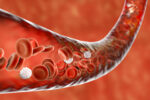Patient enrollment is complete in Phase 1 trial of ANK-700 for RRMS
Therapy induces immune tolerance, prevents myelin targeting, analyses suggest

Anokion has finished enrolling patients in the second part of its Phase 1 clinical trial investigating ANK-700 for relapsing-remitting multiple sclerosis (RRMS).
Safety data so far from the MoveS-it trial (NCT04602390) has shown the treatment is safe and well tolerated and biomarker analyses suggest it can induce immune tolerance and prevent the immune system from targeting myelin, the fatty sheath around nerve fibers that’s damaged in multiple sclerosis (MS).
The company expects to complete a one-year safety follow-up in the first half of 2024 and full data should be announced later that year.
“2023 has been a year of significant progress for Anokion, marked by … clinical data that validate our approach to reeducating critical immune pathways in the body using durable, disease-modifying medicines,” Deborah Geraghty, PhD, CEO at Anokion, said in a company press release.
A number of disease-modifying therapies are available to ease MS disease activity and prevent disability progression. Most act to dampen the immune system, interfering with the body’s ability to fight infectious invaders and other threats, however.
ANK-700 as an inverse vaccine
ANK-700 is designed to promote immune tolerance to a certain myelin protein. This involves teaching the immune system to recognize the protein as “self” and not attack it, preventing further damage to the myelin sheath.
The treatment works as an inverse vaccine in a way, one that tells the immune system a certain target shouldn’t be attacked, unlike traditional vaccines that educate the immune system to attack a given molecule.
A recent study showed the approach behind ANK-700 was effective at reducing disease activity in two animal models of MS — one that mimics the chronic disease activity in people with progressive types of the disease and the other that reflects relapsing forms of MS.
While other studies showed it could prevent the disease from developing when administered before the onset of symptoms, the recent study provided evidence it could work after symptoms are established, a more realistic timeframe for receiving treatments.
What is the MoveS-it trial studying?
The U.S.-based MoveS-it trial is a two-part study investigating the safety and effectiveness of ANK-700 in about 33 RRMS participants, ages 18-60, who are either not receiving a disease-modifying treatment, or are using fumarate-based therapies such as Tecfidera (dimethyl fumarate) or Vumerity (diroximel fumarate).
In the first portion, called a single ascending dose (SAD) part, the participants received a single infusion of ANK-700 intravenously, or into the vein. There were three groups, each getting a higher dose than the previous group. In the multiple ascending dose (MAD) part, randomly assigned patients received three infusions of one of two doses of ANK-700 or a placebo.
The trials’ main goal is to determine the therapy’s safety, as assessed by the number and severity of treatment-related side effects in a year. Assessing the drug’s pharmacological properties is a secondary goal.
Safety data gathered from both the SAD and MAD parts indicate ANK-700 is safe and well tolerated at all doses tested. Moreover, preliminary biomarker data from the MAD part indicate trends of immune tolerance to myelin proteins, including the protein in the inverse vaccine and other myelin proteins.
“We’ve completed enrollment in our MoveS-it trial assessing ANK-700 for MS, which not only further confirms the safety of the Anokion platform, but demonstrates [target]-specific trends in tolerance and bystander suppression, a highly sought after mechanism for treating complex autoimmune diseases like MS,” Geraghty said. “I am incredibly proud of the accomplishments of this team and look forward to advancing … ANK-700 as potential first-in-class [treatment].”







